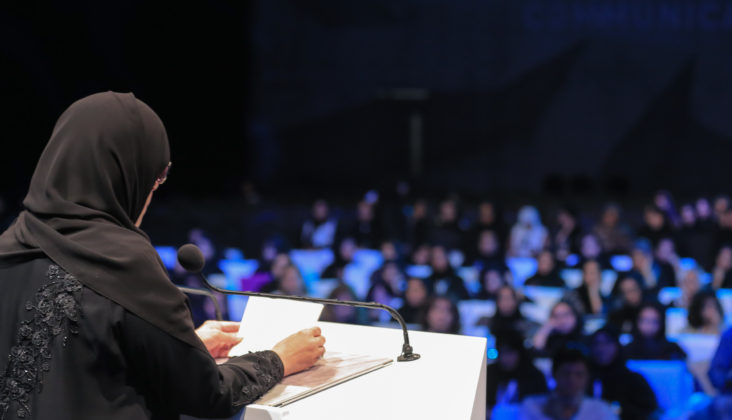Jawaher Al Qasimi: When Half The Human Race Is Left Behind, The Entire World Is Placed At An Economic Disadvantage

Inclusive and equitable economic growth can only be possible with women’s economic empowerment, Her Highness Sheikha Jawaher bint Mohammed Al Qasimi, wife of His Highness the Ruler of Sharjah and Chairperson of NAMA Women Advancement Establishment (NAMA), has stated ahead of the upcoming Women’s Economic Empowerment Global Summit (WEEGS 2019) in Sharjah.
Ensuring women’s full participation in the economy is vital to boosting economic growth and achieving the wider sustainable development goals (SDGs) outlined in the UN 2030 Agenda, Her Highness said, strongly calling upon organisations and individuals to actively engage in the second edition of WEEGS, to be held on December 10 – 11, at the Al Jawaher Reception and Convention Centre (JRCC) in Sharjah.
WEEGS is a platform that unites diverse voices and stakeholders championing the cause of gender equity and women’s economic empowerment, driving the creation and strengthening of partnerships, supporting progress, and finding effective and sustainable solutions for women’s economic inclusion, Sheikha Jawaher further added.
“Women’s realities are constantly changing,” said HH Sheikha Jawaher, adding that “Integrating women in the economic domain and investing in their development will create a ripple effect that will benefit not just individual women but families, communities and nations around the world.”
“Women are resourceful economic agents and eliminating all forms of discrimination against women is not merely a national or moral duty; it is a fundamental human right enshrined in the values of the United Nations, Her Highness asserted.
Fulfillment of Agenda 2030 means leaving no one behind
“The fight for gender equity is a shared, global concern,” said HH Sheikha Jawaher. “A key challenge to women’s economic empowerment is biased provisions often embedded in legal frameworks and policies. By advancing the public debate on gender equity, events like WEEGS can help create an enabling environment and catalyse governments, communities and legal institutions into action to frame egalitarian provisions to ensure women’s participation in the real economy.”
However, to bridge gender gaps in legislation and on the ground, the onus is on communities to consciously attempt to let go of discriminatory attitudes and mindsets, and to usher in a society that guarantees the social and economic empowerment of women, Her Highness added.
Integrated and multidimensional approaches in women’s advancement are vital to providing solutions to some of the unique challenges constraining women’s empowerment globally. “Social and economic empowerment aspects should be demarcated for women not only keeping in mind that they are – and must be – part of the labour market, but also valuable members of community with rights and duties on par with men,” pointed out HH Sheikha Jawaher. “Increasing sustainable livelihoods of women is also a tool to advance social development, as it leads to reduction in poverty, better health conditions, higher education rates, and builds more inclusive societies by promoting social harmony.”
“Agenda 2030 promises to ‘leave no one behind’; but when one half of the human race is denied the opportunity to realise their full potential, it is the entire world that is placed at an economic disadvantage,” Her Highness added.
WEEGS 2019 is organised by NAMA Women Advancement Establishment (NAMA) in line with its commitment to promoting women’s status economically and professionally, and is held in collaboration with UN Women, a global champion for women and girls.
NAMA’s leadership in advancing gender equity in the region and beyond
Since its inception in 2015, NAMA has been creating enabling environments to advance gender equity and inclusive economic and social growth, said NAMA Chairperson HH Sheikha Jawaher. “NAMA’s efforts stem from its core philosophy that gender equity is both a goal in itself and an essential prerequisite for the sustainable development of nations.”
Through its three affiliates; Sharjah Business Women Council (SBWC), Irthi Contemporary Crafts Council (Irthi), and Badiri Education and Development Academy (Badiri), NAMA has been implementing initiatives that support women across the economic, professional and social sectors, HH Sheikha Jawaher added. NAMA has been taking the lead in partnering with grassroots and international organisations to promote the active participation of women as agents of change, and to support the development of an ecosystem in which women can realise their full potential and be active contributors in economy and society.
The NAMA Chairperson particularly mentioned the entity’s partnerships with UN Women to implement one of their flagship programmes, ‘Stimulating Equal Opportunities for Women Entrepreneurs’ in the MENA region to empower 25,000 women living in poverty and facing heightened social discrimination by 2021. NAMA’s partnership with Global Network of Women Peacebuilders (GNWP) to launch the Girl Ambassadors for Peace programme (GA4P) in Bangladesh and Indonesia in 2017, in response to the escalating Rohingya crisis in these countries, has led to the training of 600 girls and young women above the age of 16 in Bangladesh (including Rohingya refugees), HH Sheikha Jawaher added.
Other significant NAMA partnerships, Her Highness noted, were with the Arab International Women’s Forum as well as with Education for Employment, which has enabled the launch of the MENA chapter of their Global Women’s Inclusion Initiative (WIP), under NAMA is fully supporting the execution of specialised EFE training programmes in Jordan, Egypt and Palestine that aim to connect 3,600 youth – including at least 50 percent young women – to meaningful employment opportunities by the first quarter of 2020.
“All these collaborations with like-minded partners have been critical to extending the reach of NAMA’s expansion programme to equip girls and women with the necessary training and resources to participate in economic activities as well as peacebuilding efforts, as well as, build a strong regional and global network of collaborators who actively support women’s entry into the labour market and helps them build on the achievements”, Sheikha Jawaher Al Qasimi concluded.

